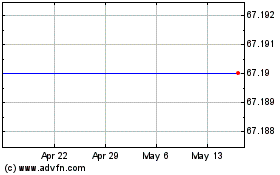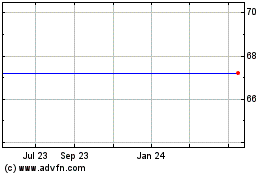By Melinda Beck
St. Louis dermatologist Madhavi Kandula is listed in a
UnitedHealth Medicare Advantage HMO directory for 2016, although
she opted out of Medicare 10 years ago and isn't eligible to
participate in the program.
"We just tell patients it is an error and they let it go at
that," said Dr. Kandula who said she repeatedly has asked
UnitedHealth Group Inc. to remove her name from its Medicare
directory.
A spokesman for UnitedHealth declined to comment on Dr.
Kandula's case but said: "We are working to simplify how care
providers update their data and how it is reported."
For now, such mistakes are an inconvenience for patients.
Starting Friday, they could be costly for insurers. New regulations
allow the Centers for Medicare and Medicaid Services to fine
insurers up to $25,000 per beneficiary for errors in Medicare
Advantage plan directories and up to $100 per beneficiary for
errors in plans sold on the federally run insurance exchanges in 37
states.
States are imposing their own rules and sanctions.
In November, California fined Anthem Blue Cross $250,000 and
Blue Shield of California $350,000, after a survey found that more
than 25% of doctors listed in their 2014 state directories weren't
at the given location or denied accepting those plans.
A spokesman for Blue Shield said it had paid more than $38
million in claims adjustments during the past two years, in part to
cover surprise out-of-network bills. "We've been very diligent in
trying to do the right thing and correct any misunderstandings that
have been out there," he added.
An Anthem spokeswoman said it spent more than $4 million during
the past two years in California making its directories more
accurate and user-friendly.
Some customers are taking legal action as well.
Consumer Watchdog, an advocacy group, has filed lawsuits against
four California insurers alleging "significant misrepresentations"
in their provider networks that left patients stuck with
out-of-network bills.
In one case, a California breast-cancer patient needed
reconstructive surgery after a double mastectomy in 2014 but six of
the eight plastic surgeons listed in her Health Net plan's
directory said they didn't accept that insurance, another was on
maternity leave and the eighth specialized in nose jobs, not breast
reconstruction, the suit alleges.
"It's the Wild West out there for consumers who are trying to
confirm that the plans they choose have the doctors they want,"
said Carmen Balber, Consumer Watchdog's executive director.
A spokesman for Health Net said the company doesn't comment on
litigation and that it "strives to provide access to quality
medical care and help our members navigate the health-care
system."
Critics long have complained that health-plan provider
directories are riddled with names of doctors who have died, moved,
retired, changed affiliations, don't accept that insurance or
aren't seeing new patients.
Insurers say it is up to providers to inform them of changes.
They advise plan members to ask their doctors if they are in
network, rather than relying on the directories.
Still, with penalties looming, many carriers have been
scrambling to update their listings.
"Plans are calling doctors' offices by the day, by the hour, by
the minute," said Clare Krusing, a spokeswoman for America's Health
Insurance Plans. She noted, however, that "oftentimes providers
won't call the plans back. Accuracy depends on both the provider
and the plan being proactive."
Thomas Suk, senior director for health care at LexisNexis, one
of several data companies that offer to "cleanse" directories for
insurers, said, "Directory management, which sounds so simple, is
an absolute nightmare for payers."
Keeping directories up-to-date is difficult in part because
relationships between doctors and hospitals are complex and
frequently changing. Many physicians see patients in multiple
locations and may be in different insurance networks at each one.
According to LexisNexis data, 30% of U.S. doctors change
affiliations every year.
Meanwhile, the complexities of insurance contracts sometimes
catch doctors off-guard. Some require contracted physicians to
participate in any new plan the carrier offers without necessarily
informing them, some allow insurers to lease their provider lists
to other insurers, and some renew automatically even if a doctor
hasn't filed a claim in years.
Dermatologist Summer Youker, who has practiced in Sacramento,
Calif., since 2008, said she had no idea she was listed in
UnitedHealth's Medicare Advantage HMO directory in the St. Louis
area, where she taught medical students from 2003 to 2008.
"As an academician, you don't know anything about insurance
contracts. The billing office does it all," she said.
St. Louis University notified UnitedHealth and other insurers in
2008 that Dr. Youker had left the school, according to an email
viewed by The Wall Street Journal. UnitedHealth declined to comment
on Dr. Youker's case.
Errors are particularly common with narrow-network plans that
exclude some local hospitals and physician groups.
UnitedHealth cut Moffitt Cancer Center in Tampa, Fla., and its
279 physicians from its Medicare Advantage network in 2014.
Nevertheless, its printed directory for 2016 lists "Moffitt Medical
Group" among the available providers in five specialties.
Moreover, dozens of non-Moffitt doctors are listed as practicing
at Moffitt's location, though a Moffitt spokesman said plan members
would incur an out-of-network bill if treated there.
A spokesman for UnitedHealth said it removed Moffitt Medical
Group from its online directory in November, and it is discussing
the other listings with a local physician group.
Despite the new penalties, making sure directories remain
up-to-date won't be easy.
The new CMS rules originally called for insurers to contact all
network providers every month to verify listings. The agency
revised that to quarterly, after opposition from insurers and
doctors.
"The last thing physicians want is for hundreds of health plans
to call them every month," said Anders Gilberg, senior vice
president of government affairs for the Medical Group Management
Association.
One alternative is to have a central database where doctors can
update their information, giving insurers a single source to
check.
The Council for Affordable Quality Healthcare, (CAQH), a
nonprofit alliance, maintains a database for credentialing
information on about 1.3 million U.S. doctors and other providers.
Eight major insurers, including Aetna, CareFirst Blue Cross Blue
Shield and UnitedHealth, launched a pilot program using that data
to update directories last summer. The alliance plans to offer the
service to all health plans in January.
Some experts urge insurers to use their own claims data to weed
out obsolete listings.
Since 2013, New Jersey health plans must attempt to contact any
provider who hasn't filed a claim in 12 months. If a provider fails
to respond in 30 days, the insurers must remove that listing. Since
then, "the number of complaints has gone down," says Larry Downs,
CEO of the Medical Society of New Jersey.
Write to Melinda Beck at HealthJournal@wsj.com
(END) Dow Jones Newswires
December 28, 2015 15:56 ET (20:56 GMT)
Copyright (c) 2015 Dow Jones & Company, Inc.
Health Net (NYSE:HNT)
Historical Stock Chart
From Dec 2024 to Jan 2025

Health Net (NYSE:HNT)
Historical Stock Chart
From Jan 2024 to Jan 2025
